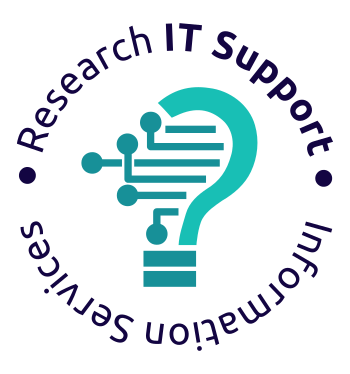
Research IT Support (RITS)
 The University of Regina research enterprise has grown considerably. It includes larger research projects with more significant technological requirements, such as software development, extensive data storage, and analysis.
The University of Regina research enterprise has grown considerably. It includes larger research projects with more significant technological requirements, such as software development, extensive data storage, and analysis.
Historically, Information Services (IS) handled the institution’s operational IT needs while balancing individual research needs. The RITS initiative was created to support all matters related to the use of computer and software infrastructure in research, including applications for funding, design, procurement, and administration of IT systems and application development.
RITS is a collaboration between the Office of the Vice-President (Research) and the Information Services team, with the purpose to help researchers assess their IT needs for proposal development, as well as executing the necessary IT development within their research projects.
Our Mission
We are pleased to support all faculty researchers at the University of Regina. Our mission is to assist researchers with:
- Software discovery and reuse.
- Supervise research software
development teams. - Advise and inform developers of best practice.
- Inter-institutional knowledge transfer.
- Outreach and communication.
- Use of Canada's Digital Research Infrastructure (DRI).
- Writing grant applications, which have research software components.
Contact
Akiff Maredia
Research IT Support Lead
Email: research.software@uregina.ca
Phone: 306-585-4089
U of R Faculty or Staff
please fill out form below
See Our Service Catalogue
- Assisting researchers in proposal writing including cost estimates for software/technical components of research proposals.
- Providing consulting to researchers on:
- Software discovery and re-use (existing software that may be of use);
- Development environments;
- Languages, libraries and 3rd party software;
- Development methodologies and software project management;
- Use of Canadian digital research infrastructure.
This is limited to providing guidance. Any development, inspection, debugging, and/or training would be billable.
The services we can provide are listed below. Please check with us to ensure that we have the expertise and capacity to address your request within your time frame and to obtain an estimate. Submit a footprints ticket or email us to request service.
- Implementing software as per grant proposal estimates;
- Software application design/architecture/proposals/recommendations/alternate analysis;
- Website development and hosting;
- Development/modification to research software (e.g. numerical analysis, statistical, simulation, visualization, data analysis);
- Assistance with SSL certificate and domain name setup (DNS) for servers;
- Procurement of IT hardware/software;
- Integration of existing software;
- Formal training on software/development environments;
- Data management – organizing, storing, querying data repositories;
- Supervise research software development teams;
- Linux server hosting and administration;
- Administration/maintenance/monitoring of deployed applications;
- Support for software platforms developed by RITS;
- Information Security Awareness training;
- Research data security and technical risk assessment for applications/projects;
- Other IT services as mutually agreed, on a time and materials basis.
Don't see your specific need? Please don't hesitate to contact us.
Request Info for Research Project
Contact us with a brief description of your research project and if you have any questions.
Researcher Funded and Supported Projects
Help for Healthcare Harm
Help for Healthcare Harm is a public website offering self-help resources to people who have experienced harm in healthcare. The RITS team developed the website, populated it with content provided by the research team, and integrated the website with a Qualtrics survey that assesses the impact of healthcare harm and asks participants to assess their experience with the self-help website.
Principal Investigator: Dr. Bridget Klest.
Decolonizing Film Festival Research
The RITS team designed and developed the website to house all project information and results from this rich research project. Decolonizing Film Festival Research in a Post-Pandemic World proposes a first step in the process of decolonizing film festival research by bringing together an international team of African film festival researchers to investigate methods to decolonize festival research.
Principal Investigator: Dr. Sheila Petty, Professor, Faculty of Media, Arts & Performance, University of Regina
Co-Principal Investigator: Dr. Estrella Sendra, Professor, King's College London
This website is also a part of the Research Sites Hub.
Centre on Aging and Health and Health Psychology Lab Website Development
The RITS team assisted the U of R Centre on Aging and Health and the Health and Psychology Laboratory, with the development of new, fully responsive, website design and with the transfer of content from their old websites.
The websites are part of a new initiative of the RITS team, the Research Sites Hub.
Pain Assessment Checklist for Seniors with Limited Ability to Communicate-II App
The RITS team assisted the Pain and Aging Lab (PAL) in the Health and Psychology Laboratory, with the transfer of the PACSLAC-II, a server-based app, from the University of Alberta to the University of Regina and with the improvement of features of this app.
Principal Investigator: Dr. Thomas Hadjistavropoulos. Professor, Department of Psychology
UR Caregiver app
The RITS team assisted the Pain and Aging Lab (PAL) in the Health and Psychology Laboratory, with the development of an app designed to help caregivers of older adults with dementia self-manage the stress associated with caregiving, prior to testing the app in a clinical trial evaluation.
Principal Investigator: Dr. Thomas Hadjistavropoulos. Professor, Department of Psychology
Online Therapy Unit
Online Therapy Unit (OTU) is an online platform that provides effective clinical treatment programs to individuals experiencing mental health difficulties. Participants in the program complete modules and receive one-on-one support through online messaging. They also train graduate students and therapists to deliver internet-based cognitive and conduct multidisciplinary research.
Working with the OTU is an excellent example for the RITS Team to the University of Regina's research community.
Executive Director: Dr. Heather Hadjistavropolous
PSPNET Families
Developed by principal investigators Dr. Heather Hadjistavropoulos (University of Regina), Dr. Heidi Cramm (Queen’s University) and Dr. Nathalie Reid (University of Regina), it accommodates users from the wide range of public safety sectors, taking into account the wide range of family compositions, career and life-cycle stages, and the variety of needs of those using the site.
PSPNET
PSPNET is an online platform that specializes in Internet-delivered Cognitive Behavioural Therapy (ICBT) for first responders and other public safety personnel (PSP). They take what is typically shared in face-to-face therapy and share it online in an easy-to-understand way that is convenient and private. Part of the Canadian Institute for Public Safety Research and Treatment (CIPSRT), housed at the University of Regina. They have staff working in various parts of Canada. PSPNET is committed to delivering exceptional online mental health care to PSP.
The founder is Dr. Heather Hadjistavropolous and the co-investigator is Dr. R. Nicholas Carleton.
Beyond Child Sponsorship
A global action tackle box that provides the materials and tools to examine and reflect upon current beliefs about, and understandings of child sponsorship (CS). The contents of this tackle box are drawn from a research study, which aimed to "move beyond CS" by cultivating a deeper understanding and critique of CS and to explore alternative critical and justice-oriented actions. This fully responsive wordpress website was designed by the RITS team.
Principal Investigator: Dr. Kathleen Nolan, Professor, Faculty of Education
Automated Detection of Non-Verbal Pain Expressions
The RITS Team assisted the Pain and Aging Lab (PAL) in the Health and Psychology Laboratory to integrate hardware components with an algorithm designed to detect facial expressions of pain in real time. This assisted with the PAL’s goal to ‘See Pain More Clearly’ and develop proof-of-concept materials for future developments and implementation in applied products.
Principal Investigator: Dr. Thomas Hadjistavropoulos, Professor, Department of Psychology
Social Media Analysis
Vista (Visual Twitter Analytics) is a research project focusing on the development of visual analytics tools that support the exploration of temporally changing topics and sentiment within Twitter. The RITS Team developed a proof-of-concept to re-engineer the existing data collection backend and visualization platform.
Principal Investigator: Dr. Orland Hoeber, Professor, Department of Computer Science
Biomass and Individual Tree Detection
Healthy forests involve complex interactions between many organisms, and new, novel techniques are being applied to solve large, long-standing questions in ecology. Working with the Forestry Dynamics Lab, the RITS Team consolidated and strengthen existing code to form a robust program that could be repeatedly employed for yearly surveys to conduct individual tree detection and calculate biomass using several machine learning algorithms.
Principal Investigator: Dr. Mark Vanderwel, Assistant Professor, Department of Biology
PSP PTSI
Taking offline program content, the RITS Team digitized "Post-traumatic Stress Injury" training materials for Public Safety Personnel (PSP) into an interactive, accessible online platform.
This process involved construction of a Moodle-based course, involving custom plugins, focusing on an Emotional Resiliency training course.
Additional Resources for Researchers
CANARIE
Together with 13 provincial and territorial partners, CANARIE is part of Canada’s National Research and Education Network (NREN). This ultra-high-speed network connects Canada’s researchers, educators, and innovators to each other and to global data, technology, and colleagues.
To strengthen the security of Canada’s research and education sector, they collaborate to fund, implement, and support cybersecurity initiatives. CANARIE also provides identity management services to the academic community and boost Canada’s startups with cloud resources and expertise in emerging technologies.
Digital Research Alliance of Canada (formerly Compute Canada)
The Digital Research Alliance ("The Alliance") of Canada serves Canadian researchers, with the objective of advancing Canada’s position as a leader in the knowledge economy on the international stage. By integrating, championing and funding the infrastructure and activities required for advanced research computing (ARC), research data management (RDM) and research software (RS), they provide the platform for the research community to access tools and services faster than ever before.
Some of Alliance’s members that provide computing services to researchers: